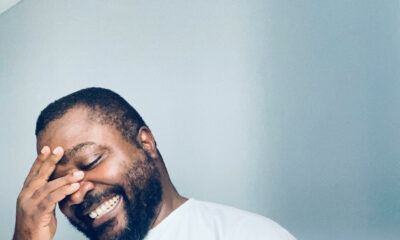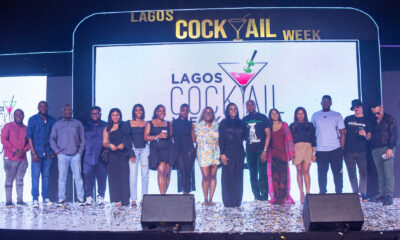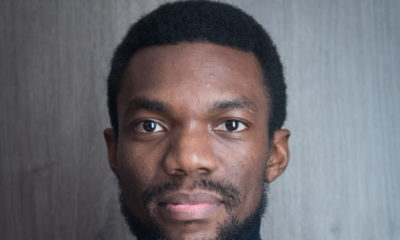Features
Creating a Safe Space for Mental Awareness in Nigeria! Meet Victor Ugo, the Man Behind MANI
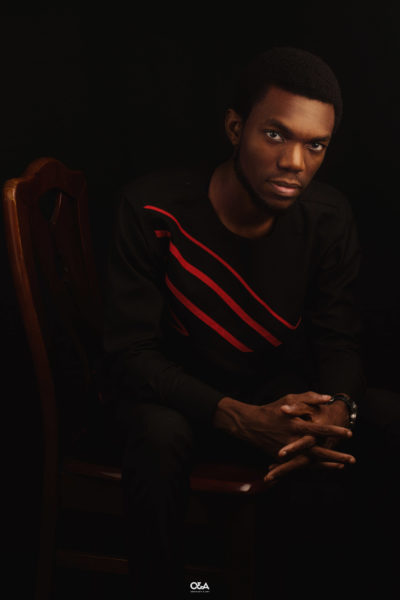 Mental health in Nigeria is one major issue that has suffered considerable neglect. The awareness and knowledge of mental disorders is extremely low, and those who visibly suffer from mental illness are largely stigmatized. While the rest of the world deals with the issues accordingly, Nigerians tend to turn a blind eye to it. Clearly, there is a dire need for hard-working advocates to supply mentally ill people with the positivity, support, and help that are essential for their recovery. Victor Ugo, an emerging leader for mental health awareness in Nigeria, strives to accomplish just that.
Mental health in Nigeria is one major issue that has suffered considerable neglect. The awareness and knowledge of mental disorders is extremely low, and those who visibly suffer from mental illness are largely stigmatized. While the rest of the world deals with the issues accordingly, Nigerians tend to turn a blind eye to it. Clearly, there is a dire need for hard-working advocates to supply mentally ill people with the positivity, support, and help that are essential for their recovery. Victor Ugo, an emerging leader for mental health awareness in Nigeria, strives to accomplish just that.
A role model, demonstrating self-initiative and an indomitable will, Victor’s role at the front of Mental Health Advocacy in Nigeria is patent in his position as the Founder of one of Nigeria’s top mental health NGOs, Mentally Aware Nigeria Initiative (MANI). Recently awarded the 2017 Nelson Mandela-Graça Michel Innovation Awards in mental health, he is more eager than ever and dedicated to helping those who suffer from mental illnesses.
He discusses his career, his dedication to the mental health movement, and his hopes for MANI. Read this interview to learn more about the impact Victor Ugo is making on the lives of mentally ill people in Nigeria.
****
Tells us about yourself
My name is Victor Ugo; I’m a medical doctor and a graduate of Igbinedion University Okada. I grew up mostly in the eastern part of Nigeria as the 3rd child in a family of 6… and the only son. I’m a huge fan of music, I find it hard to go a day without reading a book, and I’m a typical loner. I see myself as an ambitious self-motivated individual with little or no need for validation and I try to inspire everyone around me to be better just as much as I’m very open to learning from others.
What is your background in mental health?
I am a mental health advocate and the founder of the largest youth mental health network in Nigeria – Mentally Aware Nigeria Initiative; a Non-Governmental Organisation which has been in existence since 2015.
When did you realize you needed to take steps to share and create awareness?
Well, I was diagnosed with depression 4 years ago and one would have thought that as a doctor, the signs would have been clear to me, but they weren’t and that was a shocking realization to me. That was when it dawned on me that there were so many people even and especially without the medical background who would find it even more difficult and almost impossible to recognise mental health difficulties in themselves and in their close relatives. I mean, how would they even know what to look out for? This was my inspiration.
 Tell us about MANI about? Why did you feel the need to start it up and what has the journey been like?
Tell us about MANI about? Why did you feel the need to start it up and what has the journey been like?
At the beginning, I got together with a group of friends-cum-family who believed in the vision and decided to join me to push it through. We decided to brainstorm about the possible reasons other similar organizations had started and failed in the past, and we built this dream on those lessons.
It was important to start this up as the lack of awareness to mental health as well as neglected focuses like the lack of adequate facilities, and a very low number of practicing professionals made me see the need to start this up. It’s been a surprisingly inspiring journey as we have attained levels more than we even anticipated. In the time we have existed, we’ve been able to setup 6 chapters with over 500 members, intervened in over 2000 calls and messages over our suicide hotline as well as random tags on social media, as well as won international awards and partnerships. We work with the belief that our foundation is strong and we will make legible impact on the mental health space in Africa.
Seeing as mental health is a sensitive issue in Nigeria, what were the challenges you have faced so far
The challenges we have faced and still face comes down to the misunderstanding and myth peddling nature which we have ascribed to mental health and illness in Nigeria; an understanding that has led to dizzying heights in the stigma level in the country. So, in a way we don’t see them as challenges to the organization, we see them as our possible targets for impact and the sort of challenges that we have to face to be able to create the kind of society we desire; one that is free of stigma, cultural and otherwise.
How does stigma operate in individuals and in the social context? Has there been any outstanding case in your social campaigns against the stigma associated with mental illnesses?
I believe the stigma we see at this moment in our society is one that was inherited from years and years of “culturalization” and spiritualization of our typically human experiences, like falling ill. Where more physical illnesses have benefited from civilization and very loud and clear breakthroughs, no such attention has been given to the not so visible mental illnesses, which is a problem because, when you consider that every organ in the body can malfunction, why then does it seem out of the ordinary when the brain does the same? This is the message we push via our campaigns, online and offline and we hope that soon, people will start to understand it better.
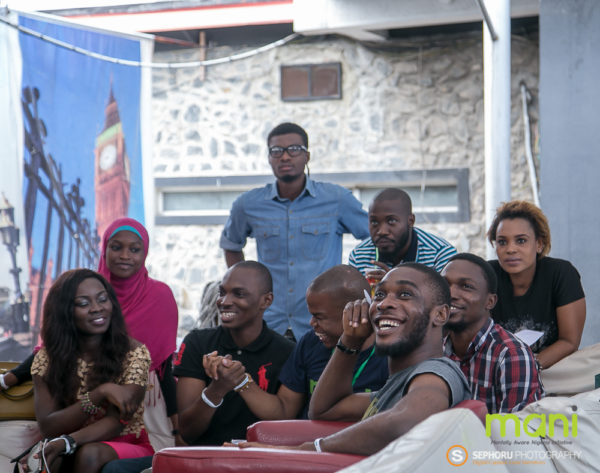 Negative stereotype is a strong hindrance to those with mental health conditions as it discourages them from getting proper medical treatment. And in Nigeria, stigma creates an unconscious bias among medical professionals. How is MANI helping with this?
Negative stereotype is a strong hindrance to those with mental health conditions as it discourages them from getting proper medical treatment. And in Nigeria, stigma creates an unconscious bias among medical professionals. How is MANI helping with this?
We do have a plan to help with this and it boils down to improving on the overall mental health literacy level in Nigeria by working to educate health professionals on the intricacies surrounding mental health. The whole reason for our existence is built on this. People need to know; educationally literate people (which includes health professionals) and educationally illiterate people, that mental illness is as physical as it gets.
What are the key steps MANI has taken so far in minimizing the stigma associated with mental illness?
In our first year of operations, we focused majorly on increasing our base and reach online, and this we did by consistently pushing out information on common mental illnesses throughout the year. Much of this was done using massive monthly online campaigns and targeted offline campaigns. We are well aware that with increasing mental health literacy levels, we will see decreasing levels of stigma, and so far, we can be sure we are on the right path with the results from our campaigns.
What are some of the cultural and social factors that have lingered in cases you have been opportune to handle
We have had cases where parents have prevented their children from seeing professionals we recommended because “what will people say?” We have even seen cases where instead of taking them to the hospital, they take them for fasts and to “them mountain” visits for prayer and cleansing. It’s frustrating to watch, but we are patient and persistent.
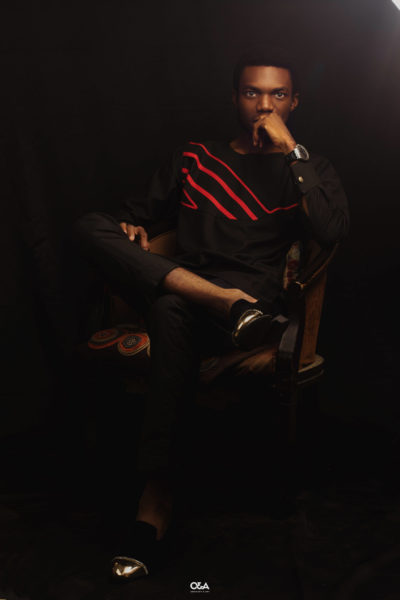 What do you think is the biggest challenge in the progress towards the understanding of mental health, especially in Nigeria?
What do you think is the biggest challenge in the progress towards the understanding of mental health, especially in Nigeria?
Lack of access to appropriate information. This defines our present goal of advocacy and awareness. I believe we have more challenges ahead, but like we see in video games with levels, we must surpass a certain level to unlock the next challenge.
There are so many kinds of mental illnesses. In your experience, what kind of mental challenges seem to be prevalent among Nigerians? and how do you diagnose them.
The most common mental illnesses from interactions on our platform will be Depression, Bipolar Disorder, Anxiety and Drug Use disorder; in no particular order. These illnesses come with symptom clusters and are time bound. Depression, for example, comes with other symptoms than just low mood, which is just one of the three core symptoms; the rest of which are, low energy and loss of pleasure in previously pleasurable activities. Along with other associated symptoms, these symptoms must be seen to persist for a fortnight.
In our organisation we teach people the tell-tale signs of most of these common illnesses and let them know when it’s time to see the psychiatrist.
How do you think Nigerians can help each other feel more comfortable talking about these issues?
There needs to be more support for those that have been courageous enough to share their struggles. Let’s do away with snide remarks that make people want to run and hide for sharing their pain. That should surely help.
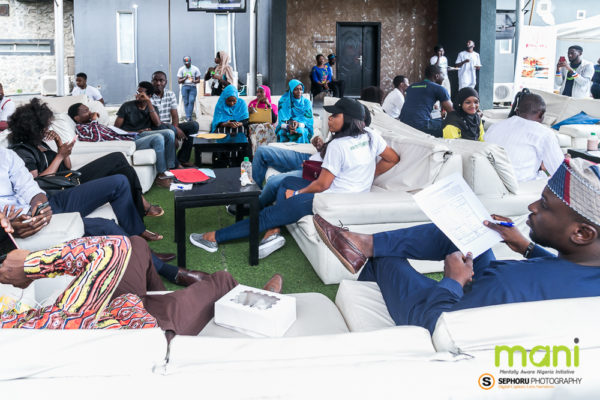
 In less than 2 years, MANI has already won the 2017 Nelson Mandela-Graça Michel Innovation Awards in mental health and you just received a nomination for the future awards 2017. How does this make you feel?
In less than 2 years, MANI has already won the 2017 Nelson Mandela-Graça Michel Innovation Awards in mental health and you just received a nomination for the future awards 2017. How does this make you feel?
I feel like we can even do so much more and that’s the spirit in our camp. I can’t wait for us to take our story to other African countries struggling with kicking off mental health advocacy.
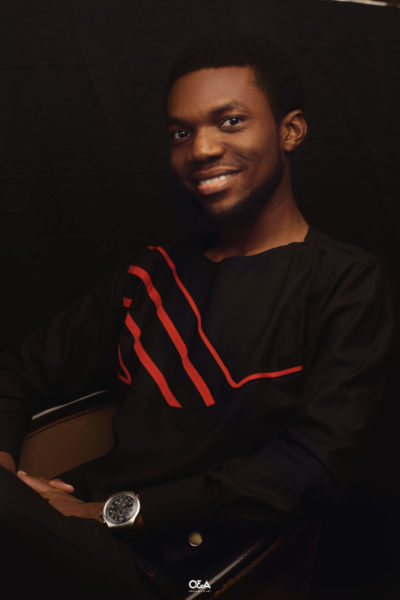
Have you had challenges dealing with your own mental health since MANI started? If yes, how have you managed them?
Yes I have, but I am very diligent with my drugs and with therapy and I make it a sin to miss any of those. I also do have great friends and family who cushion my falls now and then.
What are MANI’s long term and short term plans?
Short term plan? For this year and next, we are working on setting up a student advocacy network across all the Tertiary institutions in Nigeria.
Long term plan? We intend to do something about improving on access to psychiatric care. What that is, I can’t say just yet, but these are exciting times in the mental health space in Nigeria and we want to be at the forefront of this push.
Would you say psychiatry as a field and profession has made any progress in Nigeria? What can be done to improve the situation at the moment and how will this benefit Nigerians?
There are so many other factors affecting Psychiatry as a profession. There’s the issue of reduced satisfaction and associated brain drain in the medical profession and that has affected psychiatrists as well.
Also, the lack of adequate psychiatric facilities is also a big factor that should be considered if any improvements are to be seen.
So, progress? If there is, then it’s very much subliminal
What advice do you have for people who may be afraid or embarrassed to get help? And how can they connect to MANI?
It’s actually okay to feel afraid and embarrassed; it’s how we have been built to feel whenever it comes to mental illness. But, it’s even better if we can decide to brave the imaginary needle and reach out for help anyway way we can. I can assure you, it’s an illness and not a character flaw. You can reach out to us over our social media pages @MentallyAwareNG on Instagram, Twitter and Facebook or send us an email at [email protected]. For more information including how to get screened for possible mental illness, please go to our website – www.mentallyaware.org.
Is there anything else you’d like to add?
We are hoping for resources, partnerships with corporate organizations and philanthropic investments from benevolent individuals, so that we can keep pushing ahead with our dream. All the information needed can be found on our website – www.mentallyaware.org or an email can be send to me at [email protected].
Thank you so much for talking to us and for sharing the work you do with us. We look forward to working closely with you for positive change.


